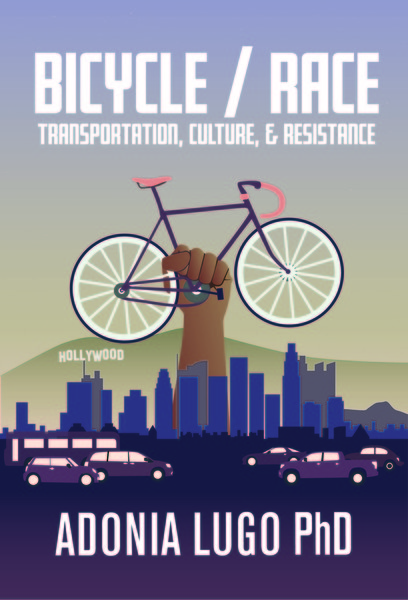The concept of "habitus" allows social theorists to talk about the connections between seemingly insignificant actions we take every day and our perspectives on what should happen in the world around us. In my graduate research, I've used it a lot to think about why biking in cities like LA is possible for some people, but seems totally crazy to others. My favorite theorist, Pierre Bourdieu, wrote a lot about habitus, building on the work of another French anthropologist, Marcel Mauss. In the 1935 essay "Techniques of the Body," Mauss characterized the body as our primary tool for experiencing the world, focusing on the importance bodily practices can have in our worldviews. The things we do over and over in our everyday lives have a lot to do with what we think we should be doing.
I usually decide to take the train instead of flying to academic conferences because riding the train allows me to use a less ecologically destructive mode of transport and it exposes me to people I would not encounter in my life at home. I've created an Amtrak habitus for myself that allows me to stay comfortable while hanging out with strangers for days at a time. When I take a long trip, I bring lavender castile soap and a little
French press. Brewing my own strong coffee and washing up with a
pleasant scent make me feel at home on the
train. Through my routine, I inhabit a familiar place while in motion. Riding long-distance trains still makes me seem like an eccentric, I guess, but it sure makes me wonder how other people get to know this enormous country.
I just got home from a trip to Montreal for the American Anthropological Association conference. My itinerary took me on the Empire Builder, Lake Shore Limited, and Adirondack trains. Some seatmates stuck out in my mind. One lady happened to have been an extra in Breaking Away, a go-to movie for bike-themed outdoor film screenings, when she was working on her anthropology PhD in Bloomington, IN. She had long ago decided against an academic career, and instead worked in museums. Another seatmate told me that she regretted raising her kids speaking only English. An Egyptian by birth, she spoke Arabic, French, Italian, and English when she married a Mexican American man who did not want his children to be multilingual. My last seatmate wrung my heart the hardest. A Navajo railroad repairman, he laughed at my jokes and showed me a video of his horse ranch. We chatted about Chinle and other Navajo places. Then he asked me for advice about his girlfriend, who was carrying their baby, and who had been posting on Facebook about late night carousing. He said that sometimes she slept and slept, and once when they'd kissed he'd been stung by something very bitter on her mouth.
Moving around the train breaks up long journeys and gives me an escape when seatmates get overwhelming. Usually I spend a day in the observation lounge. On this trip I had a morning chat with a young black woman on her way to see her boyfriend in a North Dakota oil town. She told me earnestly about her hopes for the baby she was carrying. After she reached her destination and took her bright smile off the train, I settled down to work on a dissertation chapter.
The lounge soon filled with the loud hijinks of a few white men intent on a spree. Since alcohol is sold on board trains, some people think of the trip as one long binge, and it's not uncommon for Amtrak to kick drunks off the train. These guys sipped on Black Velvet and beer and got rougher and rougher, and I started hearing jokes using the n-word. I took off my headphones, my heart pounding, wondering what I should do. Sitting there without saying anything made me feel like I was somehow complicit in their ugly repartee, not to mention unsafe as a person of color. Once they taunted a black conductor who passed through just after a fried chicken joke, I decided to do something. I caught the laughing eye of one man and said that they couldn't use such inappropriate language in a public place, that it was unacceptable and they should keep it to themselves. He immediately backed down, but his buddy, the wildest of the bunch, told me to go sit with the kids. "This is the booze car," he said.
A woman moved to the seat next to me and thanked me for saying something. We sat there for about an hour, each doing our own thing, while the same group continued with their banter but without the racist jokes. Later on I decided to tell a conductor what I'd heard. He let me know that they'd be escorting that passenger off the train at the next station. I wasn't the only person who'd been made uncomfortable, it turned out.
When I interrupt racist banter
in the lounge car, I'm making a statement about what is ok on the train. Because I was there I could assert that this train was not a segregated space that tolerated hate speech. My Amtrak habitus has shown me how many different kinds of people ride the train. As a theorist and as an activist, I know that interacting with people unlike ourselves can have a positive impact on the world we live in. Riding the train brings one into a cosmopolitan space, which unfortunately might be a novelty for many Americans. I'm glad I've been able to make it my routine.

